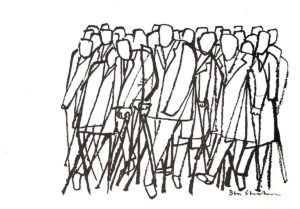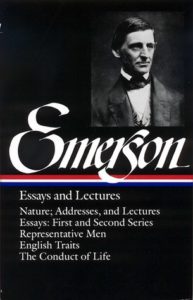Emerson & the tyranny of the masses.
“Masses are rude, lame, unmade, pernicious in their demands and influence; I wish not to concede anything to them, but to tame, drill, divide, and break them up, and draw individuals out of them”
Maria Popova/brainpickings
When you adopt the standards and the values of someone else,” Eleanor Roosevelt wrote in her timeless meditation on happiness and conformity, “you surrender your own integrity [and] become, to the extent of your surrender, less of a human being.” And yet we exist within a society, as individual particles that coagulate into the so-called masses, awash in societal standards that often permeate our consciousness without our conscious consent or even awareness. How, then, do we mediate between the inescapable social dimension of our lives and the unassailable integrity of individual personhood?
Wedged in time between Søren Kierkegaard’s keen insight into the psychology of conformity and Nobel laureate Elias Canetti’s incisive treatise on crowds and powerwas another intellectual titan of the human spirit, Ralph Waldo Emerson (May 25, 1803–April 27, 1882), who addressed this question in an essay titled “Considerations by the Way,” found in his indispensable Essays and Lectures (public library | free download).
With spirited disdain for conformity, Emerson writes:
Leave this hypocritical prating about the masses. Masses are rude, lame, unmade, pernicious in their demands and influence, and need not to be flattered but to be schooled. I wish not to concede anything to them, but to tame, drill, divide, and break them up, and draw individuals out of them… Masses! the calamity is the masses. I do not wish any mass at all, but honest men only, lovely, sweet, accomplished women only, and no shovel-handed, narrow-brained, gin-drinking million stockingers or lazzaroni at all. If government knew how, I should like to see it check, not multiply the population. When it reaches its true law of action, every man that is born will be hailed as essential. Away with this hurrah of masses, and let us have the considerate vote of single men spoken on their honor and their conscience.
[…]
The majority are unripe, and have not yet come to themselves, do not yet know their opinion. That, if they knew it, is an oracle for them and for all.
But Emerson is careful to recognize that such ripeness of conscience and character, which aligns with Einstein’s notion of “spiritual genius,” isn’t evenly distributed among the population — the most honorable and conscious individuals, he argues, are rare to come by, yet they are the ones responsible for humanity’s greatest and most lasting feats of creativity and intellect. More than a century before Jacob Bronowski asserted that “the creative personality is always one that looks on the world as fit for change and on himself as an instrument for change,” Emerson writes:
Nature makes fifty poor melons for one that is good, and shakes down a tree full of gnarled, wormy, unripe crabs, before you can find a dozen dessert apples… Nature works very hard, and only hits the white [of the bull’s eye] once in a million throws. In mankind, she is contented if she yields one master in a century. The more difficulty there is in creating good men, the more they are used when they come… All revelations, whether of mechanical or intellectual or moral science, are made not to communities, but to single persons. All the marked events of our day, all the cities, all the colonizations, may be traced back to their origin in a private brain. All the feats which make our civility were the thoughts of a few good heads.
The hope, of course, is that in the century and a half since Emerson’s day — a time when such “good heads” belonged only to white men — we have created and must continue to create more and more opportunities for greatness across all sections of the population, so that the revolutionary “revelations” Emerson extols may come from a kaleidoscope of perspectives, building toward a more beautiful and just humanity. But such a mission would only succeed on the wings of the same necessary rejection of mob mentality, the same dismantling of the mindless masses into thinking individuals, that Emerson himself so spiritedly espoused.
Surviving 45.
This piece, published by In These Times/with Liberty and Justice for All, first appeared on Timothy Snyder’s fb page.
“20 Lessons from the 20th Century on How to Survive in Trump’s America”
A history professor looks to the past to remind us to do what we can in the face of the unthinkable.
Americans are no wiser than the Europeans who saw democracy yield to fascism, Nazism or communism. Our one advantage is that we might learn from their experience. Now is a good time to do so. Here are 20 lessons from across the fearful 20th century, adapted to the circumstances of today.
1. Do not obey in advance. Much of the power of authoritarianism is freely given. In times like these, individuals think ahead about what a more repressive government will want, and then start to do it without being asked. You’ve already done this, haven’t you? Stop. Anticipatory obedience teaches authorities what is possible and accelerates unfreedom.
2. Defend an institution. Follow the courts or the media, or a court or a newspaper. Do not speak of “our institutions” unless you are making them yours by acting on their behalf. Institutions don’t protect themselves. They go down like dominoes unless each is defended from the beginning.
3. Recall professional ethics. When the leaders of state set a negative example, professional commitments to just practice become much more important. It is hard to break a rule-of-law state without lawyers, and it is hard to have show trials without judges.
4. When listening to politicians, distinguish certain words. Look out for the expansive use of “terrorism” and “extremism.” Be alive to the fatal notions of “exception” and “emergency.” Be angry about the treacherous use of patriotic vocabulary.
5. Be calm when the unthinkable arrives. When the terrorist attack comes, remember that all authoritarians at all times either await or plan such events in order to consolidate power. Think of the Reichstag fire. The sudden disaster that requires the end of the balance of power, the end of opposition parties, and so on, is the oldest trick in the Hitlerian book. Don’t fall for it.
6. Be kind to our language. Avoid pronouncing the phrases everyone else does. Think up your own way of speaking, even if only to convey that thing you think everyone is saying. (Don’t use the Internet before bed. Charge your gadgets away from your bedroom, and read.) What to read? Perhaps The Power of the Powerless by Václav Havel, 1984 by George Orwell, The Captive Mind by Czesław Milosz, The Rebel by Albert Camus, The Origins of Totalitarianism by Hannah Arendt, or Nothing is True and Everything is Possible by Peter Pomerantsev.
7. Stand out. Someone has to. It is easy, in words and deeds, to follow along. It can feel strange to do or say something different. But without that unease, there is no freedom. And the moment you set an example, the spell of the status quo is broken, and others will follow.
8. Believe in truth. To abandon facts is to abandon freedom. If nothing is true, then no one can criticize power because there is no basis upon which to do so. If nothing is true, then all is spectacle. The biggest wallet pays for the most blinding lights.
9. Investigate. Figure things out for yourself. Spend more time with long articles. Subsidize investigative journalism by subscribing to print media. Realize that some of what is on your screen is there to harm you. Learn about sites that investigate foreign propaganda pushes.
10. Practice corporeal politics. Power wants your body softening in your chair and your emotions dissipating on the screen. Get outside. Put your body in unfamiliar places with unfamiliar people. Make new friends and march with them.
11. Make eye contact and small talk. This is not just polite. It is a way to stay in touch with your surroundings, break down unnecessary social barriers, and come to understand whom you should and should not trust. If we enter a culture of denunciation, you will want to know the psychological landscape of your daily life.
12. Take responsibility for the face of the world. Notice the swastikas and the other signs of hate. Do not look away and do not get used to them. Remove them yourself and set an example for others to do so.
13. Hinder the one-party state. The parties that took over states were once something else. They exploited a historical moment to make political life impossible for their rivals. Vote in local and state elections while you can.
14. Give regularly to good causes, if you can. Pick a charity and set up autopay. Then you will know that you have made a free choice that is supporting civil society helping others doing something good.
15. Establish a private life. Nastier rulers will use what they know about you to push you around. Scrub your computer of malware. Remember that email is skywriting. Consider using alternative forms of the Internet, or simply using it less. Have personal exchanges in person. For the same reason, resolve any legal trouble. Authoritarianism works as a blackmail state, looking for the hook on which to hang you. Try not to have too many hooks.
16. Learn from others in other countries. Keep up your friendships abroad, or make new friends abroad. The present difficulties here are an element of a general trend. And no country is going to find a solution by itself. Make sure you and your family have passports.
17. Watch out for the paramilitaries. When the men with guns who have always claimed to be against the system start wearing uniforms and marching around with torches and pictures of a Leader, the end is nigh. When the pro-Leader paramilitary and the official police and military intermingle, the game is over.
18. Be reflective if you must be armed. If you carry a weapon in public service, God bless you and keep you. But know that evils of the past involved policemen and soldiers finding themselves, one day, doing irregular things. Be ready to say no. (If you do not know what this means, contact the United States Holocaust Memorial Museum and ask about training in professional ethics.)
19. Be as courageous as you can. If none of us is prepared to die for freedom, then all of us will die in unfreedom.
20. Be a patriot. The incoming president is not. Set a good example of what America means for the generations to come. They will need it.
Snowden, Doctorow and Dystopia
“Is Doctorow’s fictional utopia bravely idealistic or bitterly ironic? The answer is in our own hands. A dystopian future is in no way inevitable; Walkaway reminds us that the world we choose to build is the one we’ll inhabit. Technology empowers both the powerful and the powerless, and if we want a world with more liberty and less control, we’re going to have to fight for it.”―Edward Snowden
The Verge
by Adi Robertson & @thedextriarchy
“Last night’s talk was part of a tour for Doctorow’s newly released novel Walkaway, which is set in a future where a groundswell of high-tech nomad “walkaway” communities fight oligarchs to subvert the status quo and develop a form of immortality. Snowden pointed out that the book is a mirror version of Atlas Shrugged: instead of a few ubermensch bringing down a misguidedly egalitarian society by leaving, it’s about a mass movement of the disenfranchised threatening a society controlled by the vastly wealthy. Or, as Doctorow put it, “This is the novel about all the people who, when Atlas shrugged, said ‘Good riddance!'”
Walkaway imagines a future shaped by the same problems and possibilities Doctorow’s been playing with for years: the threat of ubiquitous surveillance and artificial scarcity, and the promise that almost any technology can be repurposed and turned against its creator.
[…]
While the talk did cover dystopia and apocalypse, the last part of its title wasn’t a joke: both Snowden and Doctorow expressed cautious hopefulness about changing the world for the better. “One of the central struggles that we all face is not ‘can we save the world?’” Snowden said. “But ‘can we lay down a brick, a foundation upon which other people can place their brick, and together we can build a home?’”
To that end, one of Doctorow’s core themes in Walkaway is subverting what he described as the popular “man against man against nature” pulp plot. “That story of humanity’s barbarism in moments of extremis, it doesn’t actually line up well with reality,” he said. “When you really talk to people who’ve lived through crises, the stories that spring to mind for them are stories of people rising to the occasion in spectacular ways.” But if the darker story is our go-to scenario in times of crisis, we’ll preemptively react to others with hostility, instead of working together to rebuild.
And this extends to more recent, topical conversations, like those around xenophobia and Trump. “There are two possible theories about what just happened in 2016. One is that secretly, tens of millions of people were absolute bastards waiting for an opportunity to vote for an absolute bastard,” said Doctorow. “The other is that people have complicated natures.”
If the second scenario is true, then there’s room to shift the conversation and find common ground with people you disagree with. “You’re not changing what’s in their mind, you’re changing what they do about it,” said Doctorow. “You’re changing whether when they lose their temper, they take a deep breath or punch the guy in the nose. When they feel that the system is unfair, they blame their neighbor, or they tell themselves that it can’t be their neighbor’s fault — it’s a wider problem.”
https://www.theverge.com/2017/5/4/15547314/edward-snowden-cory-doctorow-nypl-talk-walkaway
BLM – A Focus on Policy
[Washington Post]
By Janell Rosee & Wesley Lowery
In recent years, policing has been among the nation’s most visible issues as people outraged by use of force and racial disparities in punishment took to the streets under the “Black Lives Matter” banner. But activists say the movement’s efforts have entered a new phase — one more focused on policy than protest — prompted by the election of President Trump.
“What people are seeing is that there are less demonstrations,” said Alicia Garza, one of three women credited with coining the #BlackLivesMatter hashtag. “A lot of that is that people are channeling their energy into organizing locally, recognizing that in Trump’s America, our communities are under direct attack.”
[…]
Activists say they’re no less aware of those statistics than in years past. But like most of the political left, they were stunned by Trump’s electoral victory in November. And in the months since, they’ve grappled with the role of an antiracism movement at a time when political threats to other groups — immigrants, Muslims and women — have gained urgency and pushed more progressives into the streets in protest.
In interviews, more than half a dozen leaders in the Black Lives Matter movement said that last year’s presidential election prompted renewed focus on supporting other minority groups as well as amassing electoral power to fight an administration that has pledged to roll back Obama-era efforts to reshape policing practice. Those leaders — who hail from various factions of the decentralized movement of individuals and organizations that have, at times, clashed — said the reality of Trump’s presidency has forced a reconsideration of strategy.
“There was a lot of regrouping that had to happen within our movement and on the broader left to really think strategically,” said Asha Rosa, the national organizing co-chair for the Black Youth Project 100.
Dear White People:
‘Moonlight’ Director Barry Jenkins on His Game-Changing ‘Dear White People’ Episode
Jenkins spoke to The Daily Beast about directing ‘Dear White People,’ his own streaming series ‘Underground Railroad,’ and how he’s feeling about the Oscars these days.
[Matt Wilson]
“Chapter V” of Dear White People opens with a quote from James Baldwin: “Not everything that is faced can be changed, but nothing can be changed until it is faced.”
Each episode of Simien’s series, based on his 2014 film of the same name, focuses its attention on a different student at the fictional Ivy League school. This one tells the story of Reggie Green, beautifully portrayed by Marque Richardson, who played the same role in the film.
We get a glimpse of the micro—and not so micro—aggressions Reggie has to endure on campus on a daily basis. The white woman running away from the ATM when she sees he’s next in line, the football coach mistaking him for a member of the team.
As a filmmaker, Jenkins realized it was his job to “solve problems,” which in this case meant finding the “transitions between comedy, romance, and ultimately this tense act of emotional violence that almost becomes actual violence.”






